
A tongue-twister activity for theatre students.
- Subject:
- Performing Arts
- Material Type:
- Activity/Lab
- Author:
- Red Rocks CC
- Date Added:
- 07/10/2024

A tongue-twister activity for theatre students.
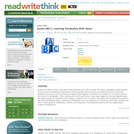
Creating an illustrated alphabet book of action words, from "attack" to "zap", reinforces the definition of verbs as it stretches and expands students' vocabulary.
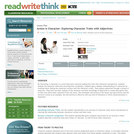
Students must "become" a character in a novel in order to describe themselves and other characters using powerful adjectives.
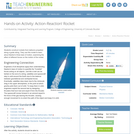
Students construct rockets from balloons propelled along a guide string. They use this model to learn about Newton's three laws of motion, examining the effect of different forces on the motion of the rocket.
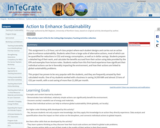
This assignment is a 10-hour, out-of-class project where each student
designs and carries out an action plan to enhance sustainability.
Students select from a large suite of alternative actions, most of which
can be quantified for reductions in CO2 and energy consumption, as well
as in dollar savings.
(Note: this resource was added to OER Commons as part of a batch upload of over 2,200 records. If you notice an issue with the quality of the metadata, please let us know by using the 'report' button and we will flag it for consideration.)
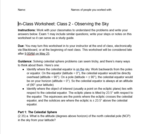
These worksheets were developed by Bryanne McDonough (PhD Candidate, Boston University) for a 6 week summer AS101 course taught at Boston University using the Openstax Astronomy 2e textbook. Each lesson was two hours long, so modification may be necessary for using these worksheets in a shorter class format, although many are already split into two parts. I'm open to feedback and would love to hear if you decide to use this resource in anyway: please contact Bryanne McDonough (bnmcd@bu.edu).
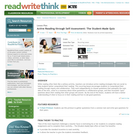
This recurring lesson encourages students to comprehend their reading through inquiry and collaboration. They choose important quotations from the text and work in groups to formulate "quiz" questions that their peers will answer.
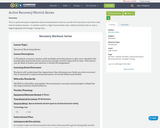
This is a quick and easy to implement active recovery/stretch series to use with a PE class that is sore from a few intense workout sessions. It could be used for a High School Aerobis Class, Lifetime Activities Class or even a Beginning/Advanced Strength Training Class.
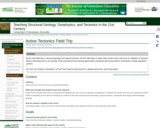
By far most field trips in structural geology and regional tectonics do NOT take place in large urban centers with a trip focus on mitigation of hazards. What is described here is an example of the instructional and learning opportunities associated with active tectonic examination of large population centers.
ACTIVE TECTONICS, HAZARDS, ACTIVE TECTONICS AND SOCIETY, URBAN GEOLOGY, EARTHQUAKES
(Note: this resource was added to OER Commons as part of a batch upload of over 2,200 records. If you notice an issue with the quality of the metadata, please let us know by using the 'report' button and we will flag it for consideration.)
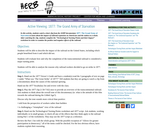
In this activity, students watch a short clip from the ASHP documentary 1877: The Grand Army of Starvationto learn about the impact of railroad expansion on Americans and the nation as a whole. After watching the clip, students complete the “Technological Turning Points and their Impact” worksheet in order to examine the positive and negative effects of the railroad.
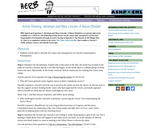
PBS American Experience’s Abraham and Mary Lincoln: A House Dividedis a 6 episode mini-series available as a 3 DVD set. The following activity focuses on the causes and consequences of Lincoln’s Emancipation Proclamation through an active viewing of Episode 4: The Dearest of All Things(Disc 2). There is a companion website to the series, The Time of the Lincolns, that contains a Teacher’s Guide, primary sources, and episode transcripts.
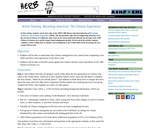
In this activity, students watch short clips of the PBS/A Bill Moyers Special production ofBecoming American: The Chinese Experience(2003). The documentary clips and accompanying materials cover the arrival of Chinese in California, their work on the transcontinental railroad, the passage of the 1882 Chinese Exclusion Act, and the Angel Island immigration facility. At the end of the activity, students complete a short writing task on whether not to immigrate to the United States from the perspective of a young Chinese man.
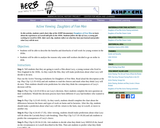
In this activity, students watch short clips of the ASHP documentary Daughters of Free Mento learn about the experiences of Lowell mill girls in the 1830s. Students follow the life of Lucy, a young girl working in Lowell in 1836. After each clip, students reflect on what they have just learned and predict what Lucy will do next.
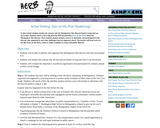
In this activity students analyze the reasons why the Montgomery Bus Boycott lasted so long and was successful. Students watch a short clip from the PBS documentary Eyes on the Prizeabout the Montgomery Bus Boycott. Then students analyze primary sources to determine who participated in the boycott, who organized it, and what challenges boycott supporters faced. The teacher will need access to the filmEyes on the Prize, which is widely available in school and public libraries.
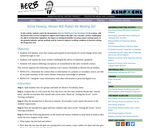
In this activity, students watch the documentary Heaven Will Protect the Working Girlin sections, with documents and exercises designed to support and reinforce the film's key concepts: workers challenging the effects of industrial capitalism, the impact on immigrant families of young women earning money in the garment industry, and the methods used by women to improve working conditions in factories during the Progressive Era.
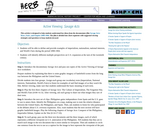
This activity is designed to help students understand key ideas from the documentary film Savage Acts: Wars, Fairs, and Empire 1898-1904. The film is divided into short segments with suggested viewing strategies and questions to keep students focused.
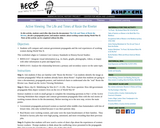
In this activity, students watch film clips from the documentary The Life and Times of Rosie the Riveter, decode a propaganda poster, and analyze statistics about working women during World War II. Parts of this activity can be completed without the film.
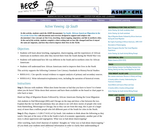
In this activity, students watch the ASHP documentary Up South: African-American Migration in the Era of the Great Warwith documents and exercises designed to support and reinforce the documentary's key concepts of Jim Crow, lynching, sharecropping, migration, and life in northern cities. At the end of the activity, students complete a short writing task on how life changed and how it stayed the same for migrants, and how they tried to improve their lives in the North.
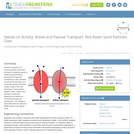
Students compare and contrast passive and active transport by playing a game to model this phenomenon. Movement through cell membranes is also modeled, as well as the structure and movement typical of the fluid mosaic model of the cell membrane. Concentration gradient, sizes, shapes and polarity of molecules determine the method of movement through cell membranes. This activity is associated with the Test your Mettle phase of the legacy cycle.
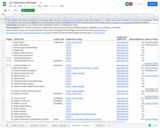
These activities cover topics in Galaxies and Cosmology, aligned with the OpenStax Astronomy textbook. Topics cover chapters 1, 5, 6, 24-30, and sections of chapter 17 and 19 concerning distance. All activities are designed to be done in small groups in the classroom, but most can be adapted for use as homework or projects. Quantitative and Hands-on activities may be used as labs.
This is one part of an astronomy resource collection by Lane Community College. This collection was built by Andrea Goering (goeringa@lanecc.edu) and Richard Wagner (wagnerr@lanecc.edu), instructors of physics and astronomy at Lane Community College in Eugene, Oregon, USA. Development of these resources was funded through LCC's OER Initiative (https://inside.lanecc.edu/oer). We'd love to hear about your use of these resources! Let us know what you're using, sign up for updates, and submit corrections, suggestions, or comments here: https://forms.gle/un49RUNs55GU3ZNF6
Find the full collection here: https://docs.google.com/spreadsheets/d/142FgVMDHZ7bu53gihe3kJ_-5PzsnuzfMklJ1ZLMFk2E/edit#gid=315930953